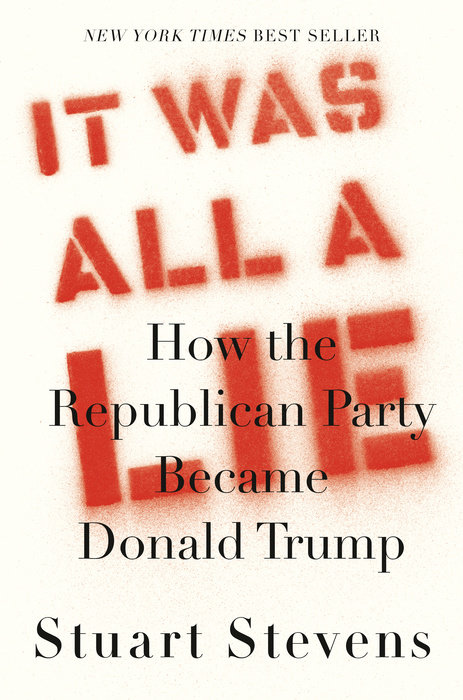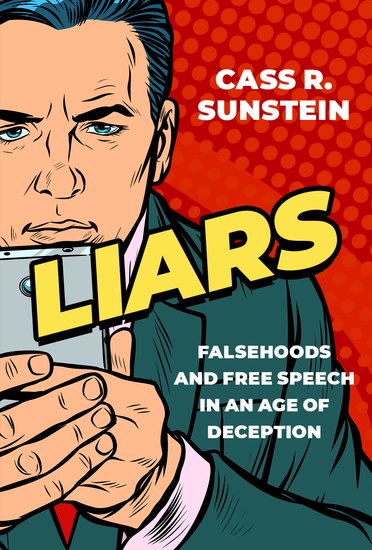I am mainly aware of the political consultant Stuart Stevens from his involvement in Mitt Romney’s 2012 presidential campaign, where he was the lead strategist, and his appearances on MSNBC during the Republican presidential primary in 2016. Neither gave me a very good view of him, considering how bad the Romney campaign was and that it seemed to me to be a bit absurd for him to then be criticizing other presidential campaigns four years later (often alongside Steve Schmidt, of Sarah Palin as vice presidential candidate fame). But I found his book, It Was All a Lie: How the Republican Party Became Donald Trump, which came out in August, to be mostly a fascinating book.
I say mostly, because you do run into things, like the inner jacket of the book description starting “From the most successful Republican political operative of his generation”, again Stuart Stevens was lead strategist of the Romney campaign. But looking past that, the book provides an insider’s telling of, as the back cover puts it, “the history of the Republican Party over the past fifty years and lays out how it became the white grievance party that it is today.” So, for example, you not only get a discussion of how conservative gays were important in pushing an anti-gay agenda, but an anecdote about the correlation between a candidate’s conservatism and the number of gay staffers.
While Stuart Stevens appears to not be trying to sugarcoat what the Republican Party has been over the years, with much of the book being something that would not be out of place in something written by liberal, there are a few points in the book where his blind spots seem to show. A glaring example early in the book involves something that Stuart Stevens was involved in that he still seems not to grasp the criticism it received. Here is his explanation of that situation starts:
In the 2012 Romney campaign, I made several ads about welfare reform. The impetus was a waiver that the Obama administration gave in the summer of 2012
to states that allowed them to reduce or eliminate work requirements. The result was a firestorm of criticism.
Twice after that he refers to this as a difference in governing philosophies:
In the Romney campaign, we saw this as a specific example of different governing philosophies.
That was the fight we wanted to be in, a differing governing philosophy about the role of government.
He said he missed racial overtones involved in this:
I should have realized that any discussion of welfare in a national campaign, particularly in a presidential race between a white candidate and an African American president, was nearly impossible without its being dominated by racial overtones.
The problem with all of that is, while there was criticism of the ads over the racial overtones, there was more criticism over the ads not only being false, but the change made by President Obama had been one that Mitt Romney has previously supported when he was governor of Massachusetts. I’m struck by how he continues not to know that.
Here he is making a claim about Paul Ryan and deficits that I think is not in keeping at all with Paul Ryan’s track record over the years:
But blaming Speaker Ryan for this deficit disaster is too easy. Had there been any remote desire or will in either party to do what it takes to cut the deficit, Ryan would have happily pushed that agenda. What happened under Ryan isn’t so much about him as about exposing the fundamental falsehood that Republicans ever cared about the deficit.
The final one of these was this:
Attacking a Democract for wasteful spending – the bridge to nowhere was a classic case –
I assume that is the referring to a proposed bridge in Alaska, which was pushed Republicans. How that is written might make you think otherwise, though it seems reasonable that wasn’t intended.
Of Note
With that out of the way, there a few things that he included in the book that I think are worth highlighting.
In the chapter “Machinery of Deception”, Stuart Stevens talks about the alternative reality produced by conservative media. What stood out to me was how he describes what that media is an alternative to:
The authors — Yochai Benkler, Robert Faris, and Hal Roberts — remind readers of the critical role played by modern institutions that serve as gatekeepers for an accepted truth. Since the end of World War II , this trend toward institutionalized professions for truth seeking has accelerated.
But what is the mainstream media? It’s the journalism that believes in standards, strives to report facts, and has a professional standard to correct errors.
The playing ground between “mainstream” media and the conservative alternatives is forever tilted against the side that has standards, because part of those standards is admitting mistakes and correcting them on the record. The result is a disproportionally long catalog of errors in the press with standards because, more often than not, there is little if any pressure within conservative journalism to admit errors, much less correct them.
While ideally that would be true, it doesn’t describe a lot of what is going on today. Not only do I have plenty of firsthand experience with them being unwilling to correct errors, but as I have documented multiple times recently, there are high-profile journalists that are lying in easy to catch ways. The reality is that journalism doesn’t have much in an enforcement mechanism for professional standards, so it isn’t clear how thing might get to (or back to) how he describes it.
Something that I found really fascinating from someone who has operated in many major campaigns was his assertion that mobilization is more important than money:
But it isn’t really the power of money that gave right-wing special interests so much power over Republican politicians; it’s the ability of those groups to mobilize. A candidate can always raise more money from different sources. An infinite amount of money is available to candidates who are willing to do the demeaning work of fund-raising and have a message that motivates some segments of the electorate. But there are a finite number of voters in every election.
That seems like something that the far left should take note of if they are interested in winning elections, since as the Bernie Sanders campaign showed, they don’t have a money issue, but do seem to have a mobilization issue.
Finally, he mentions that ahead of the 2016 he had discussions with “what passed for leadership in the Republican Party” on standing up to Donald Trump and he summarized the response as “we have to let him lose on his own”. That isn’t exactly earth shattering to hear based on everything that has happened, but it is a reminder of the cowardice that is the Republican Party.
Bottomline
If you are interested in the current moment in politics, I think book provides an interesting discussion of how we got to where we are. Even if you have read some history of the Republican Party, as I have, the insider telling of the story is worth a read. The book is about 200 pages and keeps you wanting to read more, so it is a fairly quick read. With that book length, not everything is discussed or discussed in great detail, but the book references a lot of other books, so someone looking to read more related to various subject hit on, could pick up suggestions from this book.


